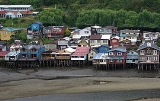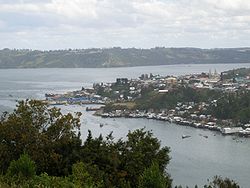
Castro, Chile
Encyclopedia

Chile
Chile ,officially the Republic of Chile , is a country in South America occupying a long, narrow coastal strip between the Andes mountains to the east and the Pacific Ocean to the west. It borders Peru to the north, Bolivia to the northeast, Argentina to the east, and the Drake Passage in the far...
an island of Chiloé Island
Chiloé Island
Chiloé Island , also known as Greater Island of Chiloé , is the largest island of the Chiloé Archipelago off the coast of Chile, in the Pacific Ocean...
. Castro is the capital of the Chiloé Province
Chiloé Province
Chiloé Province is one of the four provinces in the southern Chilean region of Los Lagos . It encompasses all of Chiloé Archipelago with the exception of the Desertores Islands. The province spans a surface area of...
in the Los Lagos Region
Los Lagos Region
Los Lagos Region is one of Chile's 15 regions, which are first order administrative divisions, and comprises four provinces: Chiloé, Llanquihue, Osorno and Palena. The region contains the country's second largest island, Chiloé, and the second largest lake, Llanquihue.Its capital is Puerto Montt;...
. It is Chile's third oldest city in continued existence. The city is located on Estero de Castro
Estero de Castro
Estero de Castro is a 20 km long inlet of the Sea of Chiloé into Chiloé Island. Castro, the capital of Chiloé Province is located on its western shores....
on the eastern coast of central Chiloé Island.
History
Rodrigo de QuirogaRodrigo de Quiroga
Rodrigo de Quiroga López de Ulloa was a Spanish conquistador of Galician origin. He was twice the Royal Governor of Chile.-Early life:...
as the temporary governor of Chile in 1567 launched a campaign led by his son in law Captain Martín Ruiz de Gamboa
Martín Ruiz de Gamboa
Martín Ruiz de Gamboa de Berriz was a Spanish Basque conquistador, and served as a Royal Governor of Chile.-Early years:He was born in Durango, Biscay, the son of Andrés Ruiz de Gamboa and Nafarra de Berriz, and served as a youth in the royal navy in the Levant...
to conquer Chiloé Island
Chiloé Island
Chiloé Island , also known as Greater Island of Chiloé , is the largest island of the Chiloé Archipelago off the coast of Chile, in the Pacific Ocean...
, establishing the city of Castro there, and pacifying its inhabitants, the Cuncos. From its founding until 1767 Castro was the administrative centre of Chiloé Island. In 1767, during the time of the Bourbon Reforms
Bourbon Reforms
The Bourbon Reforms were a set of economic and political legislation introduced by the Spanish Crown under various kings of the House of Bourbon throughout the 18th century. The reforms were intended to stimulate manufacturing and technology in order to modernize Spain...
that sought to modernize the Spanish Empire
Spanish Empire
The Spanish Empire comprised territories and colonies administered directly by Spain in Europe, in America, Africa, Asia and Oceania. It originated during the Age of Exploration and was therefore one of the first global empires. At the time of Habsburgs, Spain reached the peak of its world power....
, Chiloé was separated from the General Captaincy of Chile to which it had previously belonged and made a direct subject of the Viceroyalty of Peru
Viceroyalty of Peru
Created in 1542, the Viceroyalty of Peru was a Spanish colonial administrative district that originally contained most of Spanish-ruled South America, governed from the capital of Lima...
. To ease the communications with Lima
Lima
Lima is the capital and the largest city of Peru. It is located in the valleys of the Chillón, Rímac and Lurín rivers, in the central part of the country, on a desert coast overlooking the Pacific Ocean. Together with the seaport of Callao, it forms a contiguous urban area known as the Lima...
the capital of the archipelago was moved from Castro to Ancud
Ancud
Ancud is a city in southern Chile located in the northernmost part of the island and province of Chiloé, in Los Lagos Region .-Geography:...
in the same year. Even after the incorporation of Chiloé of into the Republic of Chile Ancud remained the capital of the archipelago. Only in 1982 did Castro regain its role as capital in Chiloé Archipelago.
Demographics
According to the 2002 censusCensus
A census is the procedure of systematically acquiring and recording information about the members of a given population. It is a regularly occurring and official count of a particular population. The term is used mostly in connection with national population and housing censuses; other common...
of the National Statistics Institute
National Statistics Institute (Chile)
The National Statistics Institute of Chile is a state-run organization of the Government of Chile, created in the second half of the 19th century and tasked with performing a general census of population and housing, then collecting, producing and publishing official demographic statistics of...
, Castro spans an area of 427.5 sqkm and has 39,366 inhabitants (19,325 men and 20,041 women). Of these, 29,148 (74%) lived in urban area
Urban area
An urban area is characterized by higher population density and vast human features in comparison to areas surrounding it. Urban areas may be cities, towns or conurbations, but the term is not commonly extended to rural settlements such as villages and hamlets.Urban areas are created and further...
s and 10,218 (26%) in rural areas. The population grew by 31.5% (9,435 persons) between the 1992 and 2002 censuses.
Administration
As a commune, Castro is a third-level administrative division of Chile administered by a municipal councilMunicipal council
A municipal council is the local government of a municipality. Specifically the term can refer to the institutions of various countries that can be translated by this term...
, headed by an alcalde
Alcalde
Alcalde , or Alcalde ordinario, is the traditional Spanish municipal magistrate, who had both judicial and administrative functions. An alcalde was, in the absence of a corregidor, the presiding officer of the Castilian cabildo and judge of first instance of a town...
who is directly elected every four years. The 2008-2012 alcalde is Nelson Águila Serpa (PDC
Christian Democratic Party
Christian democratic parties are those political parties that seek to apply Christian principles to public policy. The underlying Christian democracy movement emerged in 19th-century Europe, largely under the influence of Catholic social teaching, and it continues to be influential in Europe and...
).
Within the electoral divisions of Chile, Castro is represented in the Chamber of Deputies
Chamber of Deputies of Chile
The Chamber of Deputies of the Republic of Chile is the lower house of Chile's bicameral Congress. Its organisation and its powers and duties are defined in articles 42 to 59 of Chile's current constitution....
by Gabriel Ascencio (PDC) and Alejandro Santana (RN
National Renewal (Chile)
National Renewal , is a liberal conservative political party belonging to the Chilean right-wing political coalition Coalition for Change in conjunction with the Independent Democratic Union and the Chile First movement...
) as part of the 58th electoral district, (together with Ancud
Ancud
Ancud is a city in southern Chile located in the northernmost part of the island and province of Chiloé, in Los Lagos Region .-Geography:...
, Quemchi
Quemchi
Quemchi is a Chilean town and commune in Los Lagos Region, located in the eastern shore of Chiloé Island. It acquired certain celebrity because the famous Chilean writer Francisco Coloane was born nearby the town.-History:...
, Dalcahue
Dalcahue
Dalcahue is a port town and a commune on Chiloé Island, Los Lagos Region, Chile.-Demographics:According to the 2002 census by the National Statistics Institute, the Dalcachue commune spans an area of and had 10,693 inhabitants; of these, 4,933 lived in urban areas and 5,760 in rural areas. At...
, Curaco de Vélez
Curaco de Vélez
Curaco de Vélez is Chilean commune in Chiloé Archipelago which is part of Chiloé Province and Los Lagos Region. The commune is located in western Quinchao Island while the eastern part is administered by the commune of Quinchao.-History:...
, Quinchao
Quinchao
-External links: *...
, Puqueldón
Puqueldón
Puqueldón is Chilean commune in Chiloé Archipelago which is part of Chiloé Province and Los Lagos Region. The commune is located on Lemuy Island. Puqueldón was one of the town to receive the Bill & Melinda Gates Foundations scholarship in 2002.-History:...
, Chonchi
Chonchi
Chonchi is a Chilean town and commune located in Los Lagos Region. Chonchi is a truly rural community. The country people have given a distinct form to its valleys, hills and waterways...
, Queilén
Queilén
Queilén is a town and commune in the Archipelago of Chiloé in southern Chile. It covers a portion of the southeast of the Greater Island of Chiloé, between the communes of Chonchi, Quellón, Tranqui Island and Acuy Island...
, Quellón
Quellón
Quellón is a Chilean port city and commune in southern Chiloé Island, Los Lagos Region. It is considered an end-station of the Panamerican Highway and the Pacific Coastal Highway. The majority of men work on small boats called "lanchas" for days at a time fishing...
, Chaitén
Chaitén
Chaitén is a Chilean town, commune and former capital of the Palena Province in Los Lagos Region. The town is located north of the mouth of Yelcho River, on the east coast of the Gulf of Corcovado...
, Hualaihué
Hualaihué
Hualaihué is a Chilean commune located in Palena Province, Los Lagos Region. The communal capital is the town of Hornopirén.-Demographics:According to the 2002 census of the National Statistics Institute, Hualaihué spans an area of and has 8,273 inhabitants . Of these, 2,406 lived in urban areas...
, Futaleufú
Futaleufú, Chile
Futaleufú is a Chilean town and commune located in Palena Province, Los Lagos Region. The commune is named after Futaleufú River. Due to the eruption of Chaitén Volcano and the subsequent destruction of Chaitén, Futaleufú has been the capital of Palena Province since March 2009. The town is close...
and Palena
Palena, Chile
Palena is a Chilean commune located in Palena Province, Los Lagos Region. The commune is named after Palena Lake.-Demographics:According to the 2002 census of the National Statistics Institute, Palena spans an area of and has 1,690 inhabitants , making the commune an entirely rural area...
). The commune is represented in the Senate
Senate of Chile
The Senate of the Republic of Chile is the upper house of Chile's bicameral National Congress, as established in the current Constitution of Chile.-Composition:...
by Camilo Escalona Medina (PS
Socialist Party of Chile
The Socialist Party of Chile is a political party, that is part of the center-left Coalition of Parties for Democracy coalition. Its historical leader was the late President of Chile Salvador Allende Gossens, who was deposed by General Pinochet in 1973...
) and Carlos Kuschel Silva (RN) as part of the 17th senatorial constituency (Los Lagos Region).

